Search
Economics BSc (Hons)
Study level: Undergraduate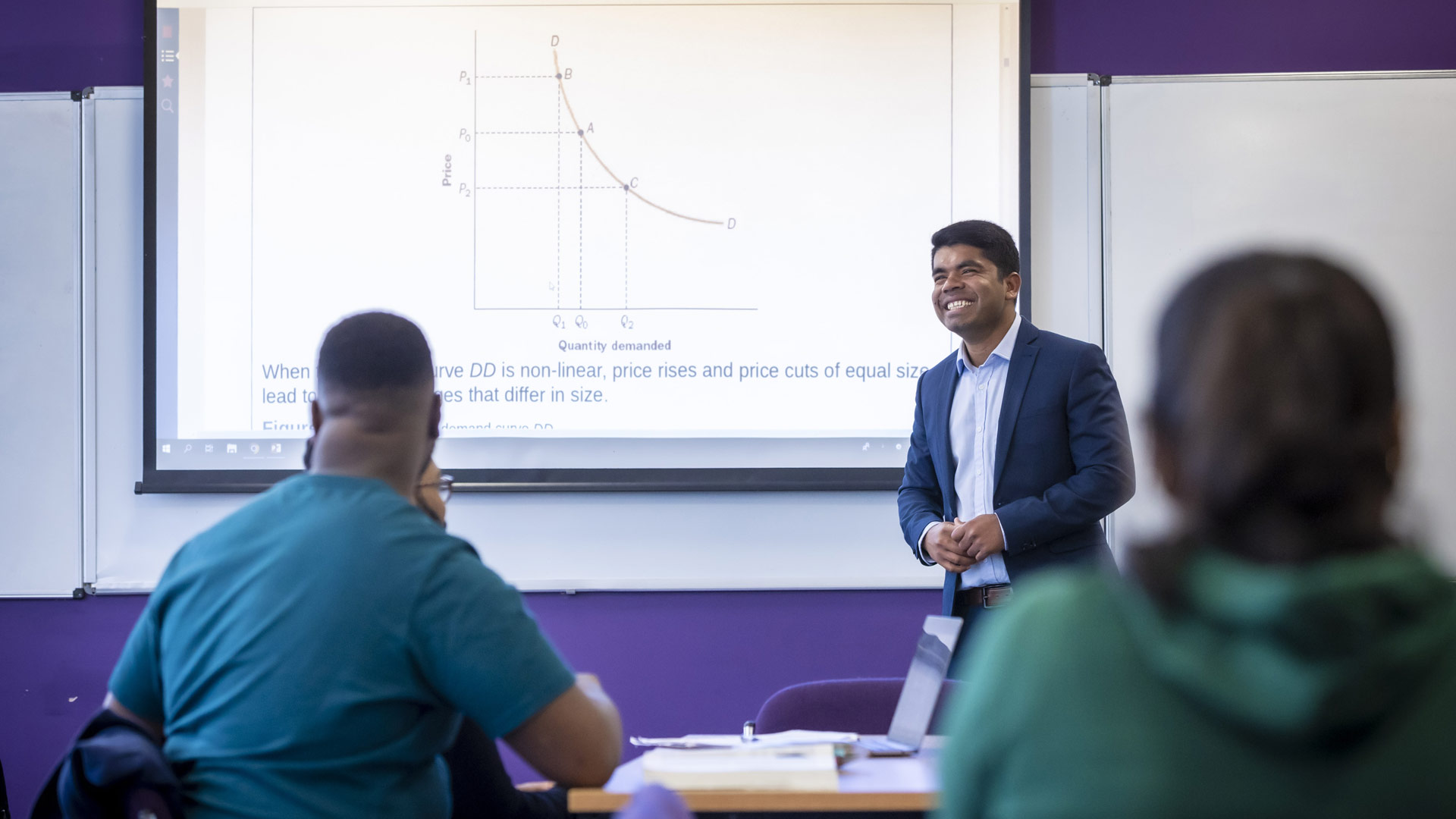
Economics shape our everyday life. From the taxes we pay to the price of anything we buy. This course explores how economics shapes society's biggest issues that could impact our everyday lives.
Course features
Year of entry
Location
Coventry University (Coventry)
Study mode
Full-time
Sandwich
Duration
3 years full-time
4 years sandwich
Condensed first year available
Course code
L100
Start date
January 2026 - condensed
Course overview
This course covers current real-world issues and aims to help you understand how economics impacts individuals, businesses, financial organisations, governments and wider society. An emphasis is placed on equipping you with the knowledge and skills required to tackle contemporary challenges facing governments and businesses.
The January start for this course is condensed in Year 1. Please see the ‘How you’ll learn’ section below for more details.
Rated Gold Overall
Teaching Excellence Framework (TEF) 20235 QS Stars for Teaching and Facilities
QS Stars University RatingsTop 5 Student City in England (Coventry)
QS Best Student Cities Index 2026Why you should study this course
By studying this course, you will have the opportunity to:
- tailor your studies as our wide range of economics and finance courses share a common year one and aim to offer you opportunities to achieve a thorough grounding in economic and financial concepts and principles
- explore both microeconomics and macroeconomics with extensive exposure to how national economies, businesses and other organisations operate in a global context
- learn alternative schools of economic thoughts and contrast heterodox approaches with the orthodox mainstream of economic theory
- build industry insight2, learn from experienced staff and hear from industry professionals who, in the past, have included speakers from HM Treasury, Lloyds Bank, Barclays and the European Commission. (Staff may be subject to change)
- develop practical skills in our Bloomberg Trading Floor4, which features contemporary Bloomberg terminals
- access additional maths and statistics support; our sigma centre offers maths and statistics support through drop-in sessions and bookable appointments with experienced tutors4.
If you choose to start this course in January you will study exactly the same course but over a slightly shorter timescale in Year 1. This is ideal if you missed the September start, want to transfer from a different university or course or just need a bit more time to prepare for life at university.
Accreditation and professional recognition
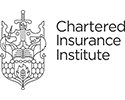
Chartered Insurance Institute
This course is recognised by the Chartered Insurance Institute (CII) for the 2025/26 intake. CII recognition allows students to gain certain exemptions from some professional examinations, upon successful completion of this course (subject to application, availability, meeting applicable visa requirements and additional fees may apply). If there is any change to the recognition of this course by the CII, we would seek to notify applicants and students as soon as possible.
My time at Coventry University studying Economics was transformative, graduating with a First-Class degree in 2024 I now work as a Client Services Manager at Lucent Financial Planning. Coventry University wasn’t just about lectures; it was about discovering what I enjoy, trying different roles, and building confidence in myself. From my placement at GlaxoSmithKline to learning how to grab opportunities, every experience helped shape my career choice. The highlight was the opportunity to pitch at an industry conference, from which the journey into my current role began. For anyone considering Economics, I’d say Coventry University is a great place to grow and find your path.
Hasna Hameed, Economics BSc Alumna, Client Services Manager, Lucent Financial Planning (quoted 2025)
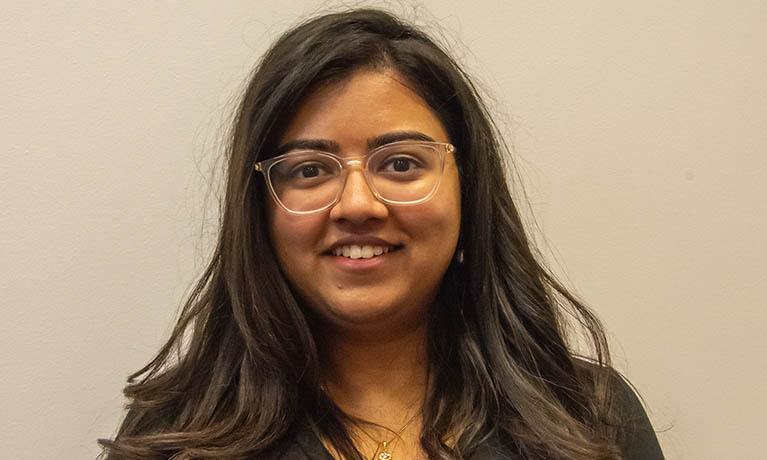
What you'll study
We regularly review our course content, to make it relevant and current for the benefit of our students. For these reasons, course modules may be updated.
The quality of support and insight provided by the knowledgeable educators was exceptional from all modules, across all three years of the degree. I truly felt that everyone in the Economics department had my best interests at heart with advice and feedback given. Furthermore, there were regular opportunities to decide which modules we were most interested in, and with my interests primarily focused on the financial sector, I was able to take advantage modules on book-keeping and financial trading in the trading floor, which were both very practical and gave a great insight into potential future careers.
Alex Hill, Economics BSc, (quoted 2023)
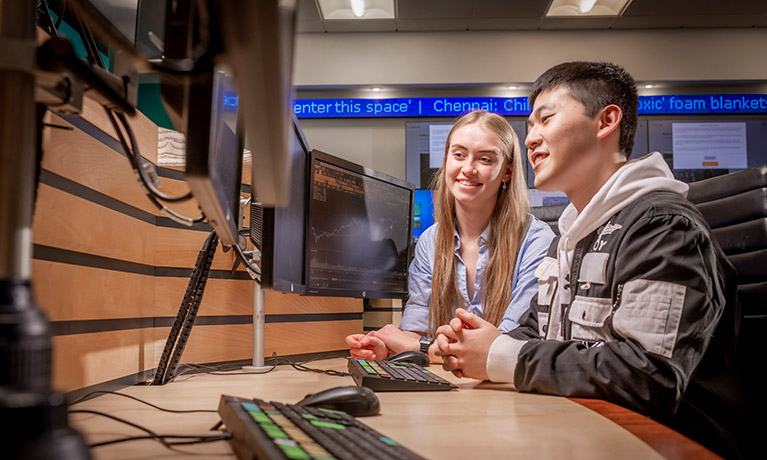
How you'll learn
This course adopts a range of teaching, learning and assessment methods such as the use of interactive teaching and learning online platforms, online quizzes, in-class feedback sessions, group projects, class experiments and bargaining simulations.
- You will gain hands-on experience of relevant quantitative software and statistical packages, such as GRETL, as well as market leading economic and financial databases such as the Organisation for Economic Co-operation and Development (OECD), World Economic Indicators, the Office for National Statistics (ONS), EuroStat, Refinitiv (Thomson Reuters Eikon and Datastream) and FitchConnect.
- You will also be taught in our Trading Floor in Europe and have access to a wealth of live and historical trading market data.
- Typically, a module involves interactive lecture(s) weekly, delivered synchronously online or on campus, followed by a range of active learning sessions such as seminars and workshops.
- In addition, you will meet other students on the course and your tutors weekly during term time to engage in community-building activities, receive support and raise concerns relating to the course.
- We aim to offer you the opportunity to attend a range of guest lectures from industry experts who come to teach in our immersive authentic learning environments (subject to availability).
If you choose to start this course in January it will be run as a condensed programme. You’ll start your course in January and finish your first year in August. Upon successful completion of Year 1, you will progress onto Year 2 in September and then continue to start subsequent years of your course in September, completing your degree at the same time as the September starters unless you opt to do a placement year.
Teaching contact hours
We understand that everyone learns differently, so each of our courses will consist of structured teaching sessions, which can include:
- on-campus lectures, seminars and workshops
- group work
- self-directed learning
- work placement opportunities2.
As a full-time undergraduate student, you will study modules totalling 120 credits each academic year. A typical 20 credit module requires a total of 200 hours study. This is made up of teaching contact hours, guided and independent study.
Teaching hours:
Teaching hours vary each semester, year of study and due to module selection. During your first year you can expect 15-18 teaching hours each week. You will also have the option to attend optional sessions including time with a progress coach or to meet with staff for advice and feedback. As you progress through your studies, teaching hours may reduce.
Guided and independent study:
Throughout your studies, you will be expected to spend time in guided and independent study to make up the required study hours per module. You’ll be digging deeper into topics, review what you’ve learned and complete assignments. This can be completed around your personal commitments. As you progress through your studies, you’ll spend more time in independent study.
Online learning:
As an innovative university, we use different teaching methods including online tools and emerging technologies. So, some of your teaching hours and assessments may be delivered online.
Assessment
This course will be assessed using a variety of methods which will vary depending upon the module.
Assessment methods may include:
- phase tests
- essays
- group work
- presentations
- reports
- projects
- coursework
- exams
- individual assignments.
The Coventry University Group assessment strategy ensures that our courses are fairly assessed and allows us to monitor student progression towards achieving the intended learning outcomes.
International experience opportunities
Coventry is a multicultural university, so our typically diverse student and staff body helps to facilitate a multicultural learning environment.
Coventry University aims to give you the global opportunities needed to become a truly global graduate, enhancing your employability on a global scale.
In the past, our students have had the opportunity to visit universities in China and Malaysia to study alongside students, see how finance is taught internationally, appreciate the issues in different countries and broaden their perspectives.
Closer to home, you may have the opportunity to participate in European field trips2 or in events like the annual Tax Week initiative or the annual Audit Week, both of which are conducted in collaboration with European universities, and see students work collaboratively on related projects.
Please note that all international experience opportunities may be subject to additional costs, competitive application, availability, and meeting applicable visa and travel requirements, and are therefore not guaranteed2.
Economics has greatly influenced the way I understand the world that revolves around me. Market trends, government policies, international trade and how they affect human life are only several of the complex issues that Economics aims to explain. I have a great amount of passion in sharing my knowledge with students —inspiring them to appreciate the lessons that the real world inculcates in our lives. By studying Economics, students also develop an array of valuable transferrable skills such as critical thinking, problem solving and data analysis. All this makes a degree in Economics a great springboard for a successful career across various industries. So, if you're curious about how the world works and want to be a well-informed and adaptable individual, then diving into Economics is the perfect path for you.
Dr Piotr Lis, Associate Professor of Economics and Deputy Head of School, 2024

Entry requirements
Typical entry requirements:
Fees and funding
| Student | Full-time | Part-time |
|---|---|---|
| UK, Ireland*, Channel Islands or Isle of Man | £9,535 per year | Not available |
| EU | £9,535 per year with EU Support Bursary** £16,800 per year without EU Support Bursary** |
Not available |
| International | £16,800 per year | Not available |
If you choose to study this course with a professional placement2 or study abroad year, you will need to pay a tuition fee3 to cover your academic support throughout your placement year. Students commencing their professional placement in the academic year 2027/28 will pay £1,500 if they are paying UK fees, or £1,800 if they are paying international fees.
For advice and guidance on tuition fees and student loans visit our Undergraduate Finance page and see The University’s Tuition Fee and Refund Terms and Conditions.
The University will charge the tuition fees that are stated in the above table for the first Academic Year of study. The University will review tuition fees each year. For UK (home) students, if Parliament permits an increase in tuition fees, the university may increase fees for each subsequent year of study in line with any such changes. Note that any increase is expected to be in line with inflation.
If you choose to study this course with a professional placement, the University will charge the tuition fees stated above for those on a placement during Academic Year 2027/28. The University will review professional placement tuition fees each year. For UK (home) students, the University may increase fees for each subsequent year of study, but such that it will be no more than 5% above inflation.
For international students, we may increase fees each year, but such increases will be no more than 5% above inflation. If you defer your course start date or have to extend your studies beyond the normal duration of the course (e.g. to repeat a year or resit examinations) the University reserves the right to charge you fees at a higher rate and/or in accordance with any legislative changes during the additional period of study.
We offer a range of International scholarships to students all over the world. For more information, visit our International Scholarships page.
Tuition fees cover the cost of your teaching, assessments, facilities and support services. There may be additional costs not covered by this fee such as accommodation and living costs, recommended reading books, stationery, printing and re-assessments should you need them. Find out what's included in your tuition costs.
The following are additional costs not included in the tuition fees:
- Any optional overseas field trips or visits: £400+ per trip.
- Any costs associated with securing, attending or completing a placement (whether in the UK or abroad).
Condensed course – January start date
If you choose to start this course in January please make sure you check the Fees and Finance page for more information. Although starting this course in January does not prohibit you from being eligible for student finance, the way it is paid in your first year differs from those who start their course in September.
If you start the course in January, your tuition fees will be paid in accordance with the university’s Tuition Fees, Refund and Withdrawal Terms and Conditions for January starters and for any further years of study, your fees will be paid in accordance with the terms for September starters.
*Irish student fees
The rights of Irish residents to study in the UK are preserved under the Common Travel Area arrangement. If you are an Irish student and meet the residency criteria, you can study in England, pay the same level of tuition fees as English students and utilise the Tuition Fee Loan.
**EU Support Bursary
Following the UK's exit from the European Union, we are offering financial support to all eligible EU students who wish to study an undergraduate or a postgraduate degree with us full-time. This bursary will be used to offset the cost of your tuition fees to bring them in line with that of UK students. Students studying a degree with a foundation year with us are not eligible for the bursary.
Facilities
We have a range of facilities available to support our students in putting the theories you are taught into practice4.
Facilities are subject to availability. Access to some facilities (including some teaching and learning spaces) may vary from those advertised and/or may have reduced availability or restrictions where the university is following public authority guidance, decisions or orders.
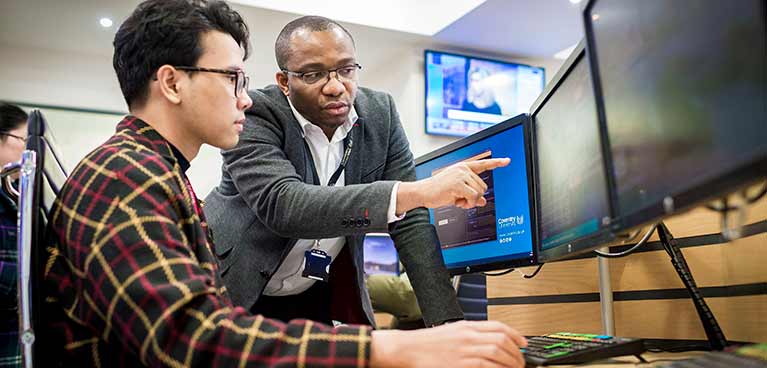
The Trading Floor
The Trading Floor is an invaluable facility that allows you to get hands-on with industry-standard software. Featuring contemporary dual-screen Bloomberg terminals, the facility adds a dynamic practical element to your course.

Talent Team
Employability is at the forefront of all our accounting and finance courses. Our dedicated Talent Team are also on hand to help. They can assist you in applying for work placements, graduate level jobs and offer skills development workshops, and also organise networking events to introduce you to potential employers and industry contacts.

sigma Centre
The sigma Centre is housed in our Lanchester Library and offers maths and statistics support through drop-in sessions and bookable appointments. It is the ideal place to help you navigate any issues you might have while studying an accounting and finance degree.
Careers and opportunities
Upon successful completion, you will be able to:
- critically evaluate modern economic theories and the empirical methods used by economists
- demonstrate knowledge of the workings of economic systems, both within the UK and the wider global economy, including the ability to interpret relevant data and evaluate government policies
- apply economic theories, rooted in alternative schools of thought, and empirical methods to real-world situations by making appropriate use of data, abstraction, and logical reasoning, to analyse economic events and issues
- communicate technical concepts related to economic analysis and policy debates to a diverse range of audiences and develop the ability to influence relevant stakeholders
- examine issues of sustainability and ethics from an economic perspective, and critically appraise the ethical and sustainability implications of economic policy.
- Integrate issues of national economic policy and analysis into a global context, and hence appreciate the value of international cooperation
- use a range of entrepreneurial, innovative and transferable skills, such as writing clear and concise reports based on evidence and logic, making effective use of information technology, confident delivery of presentations, creative problem solving, financial skills and self-motivation.
The course aims to give you an in-depth knowledge of economic theories and models, with strong analytical and problem-solving skills and mathematical ability. You should also be able to demonstrate a wide range of desirable professional skills, including team working, critical evaluation, self-directed learning, problem-solving, action planning and organising, written and oral communication, questioning and listening. The following personal qualities will also be addressed in each of the skills modules: achievement orientation, initiative and creativity, self-confidence, decisiveness, reflectiveness, adaptability and flexibility.
Where our graduates work
The course aims to help you pursue a variety of potential future career options in investment banking, accountancy, tax consultancy, the public sector, auditing, derivatives trading, management consultancy, mergers and acquisitions, and many more. Past graduates have found employment in a variety of careers with prestigious employers such as Capita, Lloyd's Bank, Amey and the Department for Education.
Typical roles that graduates from this course may progress to include Consultant, Business Analyst, Junior Trader or Buyer.
Further study
Alternatively, you may decide to pursue postgraduate study opportunities which could further enhance your employability by studying courses such as Accounting and Financial Management MSc or Finance MSc at Coventry Business School, or Global Finance MSc or Global Financial Trading MSc at Coventry University London. You may be entitled to an alumni discount on your fees if you decide to extend your time with us by progressing from undergraduate to postgraduate study.

Discover Phoenix+
Phoenix+ brings you together with other students to learn, experience and develop essential knowledge and skills. Whatever destination you choose, it's about preparing you for life after university.
Learn more about Phoenix+How to apply
You may also like

Business Economics BSc (Hons)

Financial Economics BSc (Hons)






